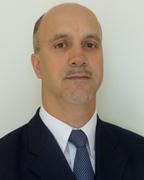
Electronics, Communications and Networks


Biography: Larbi Talbi (S'95–M'97–SM'05) received the M.S. and Ph.D. degrees in electrical engineering from Laval University, Quebec City, QC, Canada, in 1989 and 1994, respectively. He is currently Professor and Head of the Department of Computer Science and Engineering (DCSE), University of Quebec in Outaouais (UQO), Gatineau, QC, Canada. He completed a Postdoctoral Fellowship within the Personal Communications Research Group, INRS-Telecommunications, Montreal, QC, Canada (1994–1995), where he led projects supported by Bell-Canada. From 1995 to 1998, he was an Assistant Professor at the Electronics Engineering Department, Riyadh College of Technology, Saudi Arabia. During 1998–1999, he was an Invited Professor at the Electrical and Computer Engineering Department, University Laval, Quebec, Canada. In 1999, he joined the DCSE, University of Quebec in Outaouais, as Professor, from 2007 to 2013 he was the Ph.D. Program Chair in Sciences and Information Technologies. In 2005, he spent his sabbatical leave, as invited researcher, at the Communication Research Center (CRC), Ottawa, Ontario, within the Propagation Research (RVEP) group of the Satellite Communications and Radio Propagation Branch (VPSAT). In 2006, he was a Visiting Professor at the Electrical and Electronics Engineering Department, Dumlupinar University, Turkey. Beside CRC he has also a very strong collaboration with the Telebec Wireless Underground Communication Laboratory, Val-d’Or, Quebec. His research activities include experimental characterization and modeling of UHF/EHF indoor radio propagation channels and design of antennas and microwave circuits for wireless communication systems. Currently he is actively involved in major projects related to the deployment of wireless technologies in underground mines, mainly, experimental characterization of the underground mine channels using MIMO antennas at 60 GHz, design of microwave and RF components using SIW technique, transparent antennas, metamaterials applied to microwave design, antenna array for wireless applications. In 2013, he was awarded the Best Paper Prize of IET – ICWCA conference held in Malaysia. He has authored and coauthored over 200 journal and conference technical papers.
Prof. Talbi is a member of the Order of Engineers of the Province of Quebec. He frequently serves as a technical program committee member of international and national conferences. He is an Associate Editor of the International Journal of Antennas and Propagation , Hindawi Publishing Corporation and he regularly acts as a Reviewer for many international scientific journals and conferences and also for research funding organizations.
Speech Title: NLOS Millimeter Wave Backhaul for Small Cells
Abstract: Large-scale deployment of small cells is expected to be one of the many ways to meet future growing demand for network capacity and ubiquitous connectivity. Their rapid proliferation in various environments and locations will, however, result in backhaul challenges. A wireless backhaul with a fiber-equivalent performance is required in these conditions to help facilitate small cell deployment. This paper presents and analyzes experimental results of medium range propagation channel measurements obtained at 60 GHz under No-Line-Of-Sight (NLOS) conditions. These results have been theoretically validated using the uniform theory of diffraction (UTD) approach of Pathak formulation. Cylindrical reflectors with different size were installed to ascertain that the specular reflection in the direction of the NLOS areas is maximized. Root-Mean-Square (RMS) delay spread, path loss and signal intensity are investigated. A strong relationship is found between the use of a reflector and the received signal strength. Although, a very high loss of received signal power is noticed, it is found that the presence of adequate passive reflectors, strategically located, will help minimize delay spread and maximize the received energy level in NLOS scenarios. Finally, the results achieved using a reflector can be used to help design 60 GHz medium range NLOS backhaul.